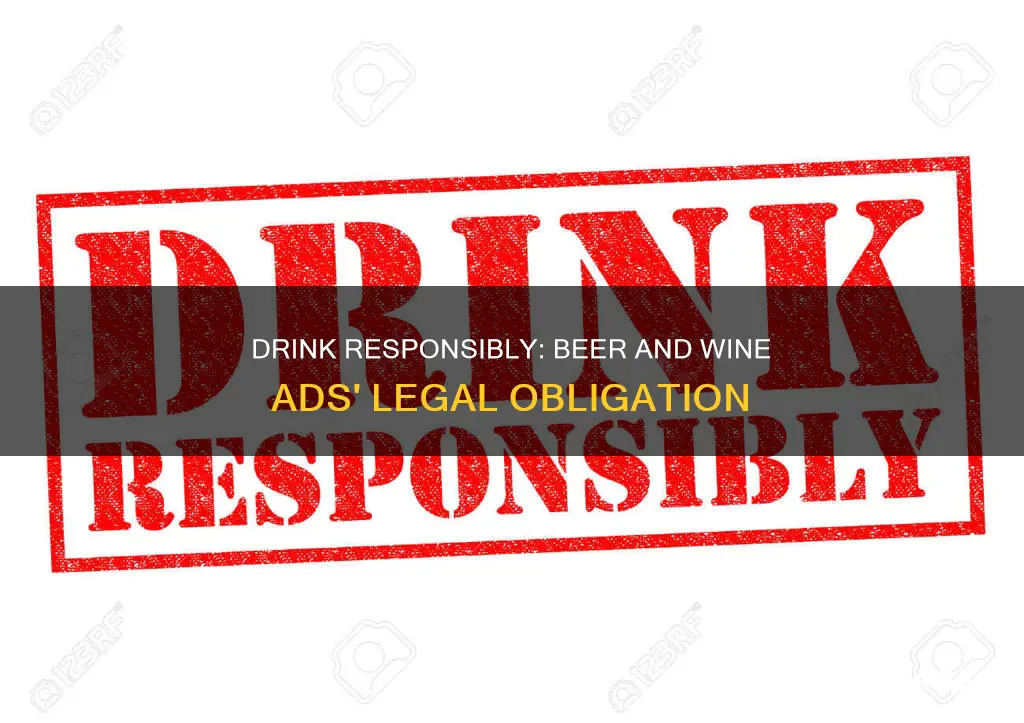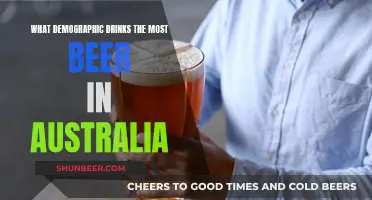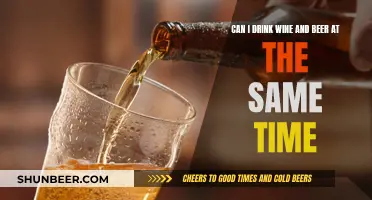
Alcohol advertisers are not required by law to include drink responsibly messages in their promotions. However, according to a Johns Hopkins University study, 87% of magazine ads for liquor, beer, and alcopop beverages contain such messages. The alcohol industry's voluntary codes for marketing and promotion emphasize responsibility but provide no clear definition of responsible drinking. Critics argue that these messages are often overshadowed by sophisticated and powerful digital advertising that creates immersive and fun environments, overriding any sense of responsibility. While the alcohol industry claims that responsibility messages serve as reminders to consume in moderation, experts suggest that more effective and specific warnings about the dangers of excessive drinking are needed.
| Characteristics | Values |
|---|---|
| Are beer and wine advertisers required to say "drink responsibly"? | No, it is not a legal requirement. |
| Who enforces the rules on alcohol advertising? | The Tobacco Tax and Trade Bureau (TTB), which is hosted by the Department of the Treasury. |
| What are the rules on alcohol advertising? | Advertisements must be truthful and without deception. They must provide enough information about the identity of the product for the consumer’s benefit and for them to be able to make an educated decision about what the product is or what it contains. |
| Do advertisers have to get approval for ads before they are placed? | No, but the TTB provides a free voluntary pre-screening service. |
| What do critics say about the "drink responsibly" message? | Critics say the message is vague and does not provide specifics about what constitutes responsible drinking. |
What You'll Learn

No legal requirement to include drink responsibly
While it is common to see "drink responsibly" messages in alcohol advertisements, there is no legal requirement for advertisers to include these statements. Federal regulations in the United States do not mandate the inclusion of "responsibility" statements in alcohol advertising. The decision to include such messages is voluntary on the part of the alcohol industry.
The alcohol industry's marketing and promotion often emphasize responsibility, but they do not provide a clear definition of what constitutes "responsible drinking." This lack of specificity can render these messages ineffective and misleading. For instance, a study by researchers at Johns Hopkins University found that 87% of magazine ads for liquor, beer, and alcopop beverages contained responsibility messages, but none of these ads provided specific information or guidelines about responsible drinking. The messages were often displayed in small print and served to reinforce product promotion rather than convey meaningful health information.
The absence of a legal requirement for "drink responsibly" statements in alcohol advertising highlights the need for more effective measures to promote responsible drinking. Alcohol is a widely consumed substance, and its popularity can lead to issues of dependence and addiction. As such, public health experts and critics have called for more substantive and prominent warning messages in alcohol advertisements that directly address the risks associated with excessive alcohol consumption.
It is worth noting that while there is no legal mandate for "drink responsibly" statements, alcoholic beverage advertisements in the United States are subject to certain regulations. These regulations are overseen by the Tobacco Tax and Trade Bureau (TTB) under the Federal Alcohol Administration Act (FAA). The TTB ensures that advertisements provide truthful and non-deceptive information about the product, including its identity and relevant details like class, type, and alcohol content. Additionally, alcoholic beverage companies voluntarily adopt self-regulatory standards to discourage underage drinking in their marketing strategies.
Beer Towers: How Do They Work?
You may want to see also

Drink responsibly messages promote products, not public health
Alcohol advertisers are not required to include "drink responsibly" messages in their promotions. However, a study by the Johns Hopkins Bloomberg School of Public Health has found that when these messages are included, they promote products rather than public health.
The study, published in the September 2014 issue of Drug and Alcohol Dependence, analyzed alcohol advertisements in US magazines from 2008 to 2010. It found that while 87% of the ads included a responsibility message, none of them defined what responsible drinking actually means. For example, the ads did not encourage abstinence in certain situations, such as when operating heavy machinery or when pregnant.
The study also found that responsibility messages were often displayed in a smaller font than the company's tagline or slogan. In 88% of cases, these messages reinforced the promotion of the advertised product and even directly contradicted the scenes depicted in the ads. For instance, an ad for vodka showed a photograph of an open pour of alcohol with a tagline implying the drinker had been partying all night. The same ad, in small lettering, advised the audience to enjoy the product responsibly.
According to the study's leader, Katherine Clegg Smith, PhD:
> "While responsibility messages were present in almost nine out of ten ads, none of them provided any information about what it means to drink responsibly. Instead, we found that the vast majority of responsibility messages were used to convey promotional information, such as appealing product qualities or how the product should be consumed."
Federal regulations do not require "responsibility" statements in alcohol advertising. While the alcohol industry's voluntary codes for marketing and promotion emphasize responsibility, they do not define what constitutes "responsible drinking."
David Jernigan, PhD, director of the Center on Alcohol Marketing and Youth at the Johns Hopkins Bloomberg School of Public Health, commented on the contradiction between appearing to promote responsible drinking and using "drink responsibly" messages to reinforce product promotion. He suggested that these messages can be deceptive and misleading.
Beer Overdose: Can Drinking Beer Kill You?
You may want to see also

Alcohol ads aimed at young people
Alcohol advertising has been linked to young people starting to drink at earlier ages and to binge drinking. Young people are exposed to a lot of alcohol advertisements. On social media platforms alone, such as TikTok, Facebook, Snapchat, and Instagram, they see over 40,000 ads per year.
Alcohol companies have vowed to self-regulate to keep their advertisements away from children. These codes cover how companies should place their ads on television, internet sites, social media, radio stations, and more. However, researchers have consistently found that alcohol advertisers routinely violate these codes. A meta-analysis reviewed a total of 96 peer-reviewed studies, and all of them found content harmful to children and adolescents. The analysis further found 57 studies that showed high levels of youth exposure to and awareness of alcohol ads on television, radio, print, digital, and outdoor advertisements.
In the US, federal regulations do not require "responsibility" statements in alcohol advertising. However, the alcohol industry's voluntary codes for marketing and promotion emphasize responsibility, without providing a definition for "responsible drinking". According to a study by the Johns Hopkins Bloomberg School of Public Health, most ads analyzed (87%) incorporated a responsibility message, but none defined responsible drinking or promoted abstinence at particular times or in certain situations.
Alcohol ads on social media often link alcohol with good feelings, friendship, and success. This can be dangerous as young people may not fully understand the risks associated with alcohol consumption. Popular social media platforms have provided alcohol companies with new and cheaper ways to promote alcohol to young people. Nearly all Australian teenagers (90%) see regular online ads that provide easy access to buy alcohol through a 'shop now' button, often without age verification.
To prevent alcohol ads from influencing young people, parents and teachers can play a crucial role by teaching children media literacy. This will help them recognize ads, analyze their influence, and develop critical thinking skills. Additionally, prevention advocates can push for local restrictions on advertisements for alcohol products in areas frequented by youth, such as local athletic sites, schools, malls, and libraries.
Drinking Beer While Driving in California: What's Allowed?
You may want to see also

Alcohol advertising is a multibillion-dollar industry
Television has traditionally been the most popular medium for alcohol advertising, with around 89% of advertising dollars spent on TV ads. However, this trend may be shifting towards digital platforms, as advertisers seek to leverage the benefits of online ecosystems, such as OTT and social media. In 2022, alcohol advertisers invested nearly $1.7 billion to promote beers, wines, and spirits, with advertisers from five categories (beer, whiskey, hard seltzer, wine, and vodka) accounting for 86% of the industry's investment.
While the alcohol industry is not legally required to include "responsibility" statements in their advertisements, many ads do contain messages such as "drink responsibly" or "enjoy in moderation." However, these messages have been criticized for failing to provide clear warnings about the risks associated with alcohol consumption and for reinforcing product promotion rather than promoting public health.
The marketing and advertising of alcoholic beverages in the US are regulated by the Federal Alcohol Administration Act (FAA) and the Tobacco Tax and Trade Bureau (TTB). While the First Amendment limits the government's ability to regulate advertising content, alcohol advertisements must be truthful, without deception, and provide sufficient information for consumers to make informed decisions.
Alcoholic beverage advertisements are also required to include specific information depending on the type of beverage, such as the class of the product, the name and address of the advertiser, alcohol content, and other relevant details. Additionally, there are prohibited practices for alcoholic advertisements, including misleading statements, indecent representations, and false claims about health benefits.
Beer Ounces: Understanding Standard Drink Sizes
You may want to see also

Alcohol is the most widely-used drug by American youth
Alcohol is the most widely used drug by American youth. According to a study by the National Institute on Drug Abuse (NIDA), 15.2% of eighth graders, 31.3% of tenth graders, and 51.9% of twelfth graders reported alcohol use in the past year. This amounts to 9.15% of all 12- to 17-year-olds using alcohol in the last month, with 1.19 million reporting binge drinking within this age group. By the time they reach twelfth grade, 61.5% of teens have abused alcohol.
Alcohol advertising often includes reminders to "drink responsibly" or "enjoy in moderation." However, these messages are not federally mandated and fail to convey basic public health information. A study by the Johns Hopkins Bloomberg School of Public Health found that while 87% of alcohol ads included such reminders, none defined responsible drinking or promoted abstinence in specific situations. The reminders were often displayed in smaller fonts than the product tagline or slogan and directly contradicted the scenes depicted in the ads.
The Monitoring the Future survey, conducted annually by researchers at the University of Michigan, provides valuable insights into substance use behaviors and attitudes among American youth. The 2022 results showed that alcohol use remained stable or declined compared to pre-pandemic levels. However, it is worth noting that alcohol is still the most commonly abused substance among teens and young adults, highlighting the importance of effective educational initiatives and public health measures to address this issue.
Beer and Jury Duty: What's the Verdict?
You may want to see also
Frequently asked questions
No, it is not a legal requirement for beer and wine advertisers to include "Drink Responsibly" in their advertisements. However, most ads do include such messages to promote responsible drinking and to avoid further litigation.
In the US, the marketing and advertising of alcoholic beverages are regulated under the Federal Alcohol Administration Act (FAA) by the Tobacco Tax and Trade Bureau (TTB). Alcoholic beverage advertisements must be truthful and without deception and provide enough information about the product for consumers to make educated decisions.
For wine products, the following information is required: the name, city, and state, or contact information of the advertiser; and the class, type, or distinctive designation of the wine (e.g. red wine, Chardonnay, etc.). Beer advertisements must include the class of the product (e.g. ale, stout, lager, etc.), the name and address of the advertiser, and the type or class of the beer. Distilled spirits advertisements must include the name, city, and state, or contact information of the advertiser; the class and type of the product (e.g. whiskey, vodka, etc.); the alcohol content by volume; and, if applicable, the name of the commodity and percentage of neutral spirits.
Some general prohibited practices for alcoholic beverage advertisements include: misleading, false, or untrue statements; making negative or disparaging comments about competitors; using indecent or obscene representations; misrepresenting analyses, standards, or tests; making misleading guarantees or health benefit claims; and using certain words or phrases such as "bonded" or "pure".
Alcoholic beverage companies and the advertising industry have adopted self-regulatory standards to discourage underage drinking. These include agreeing to not appeal to an audience under the age of 21 and ensuring that no more than 28.4% of the advertisement's audience is underage. Physical advertisements are also not placed near schools, public playgrounds, or other locations with high underage traffic.







